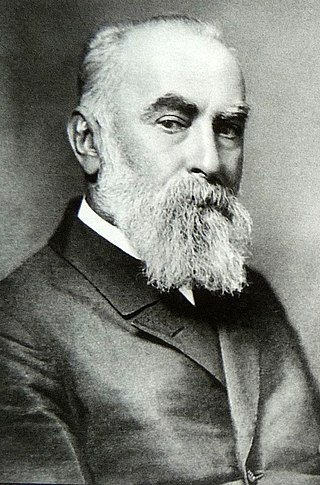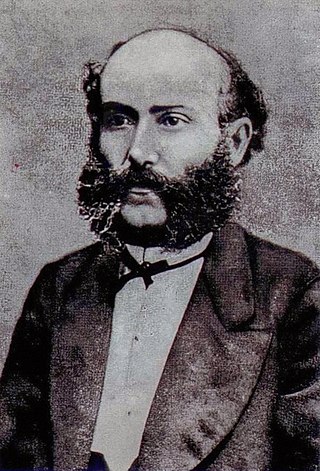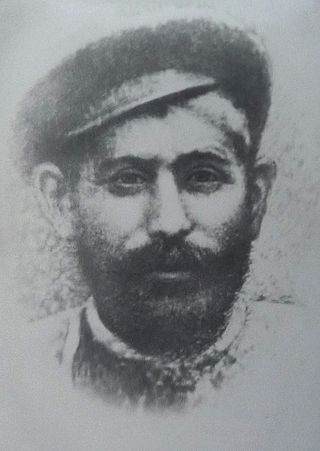
Prince Ilia Chavchavadze was a Georgian public figure, journalist, publisher, writer and poet who spearheaded the revival of Georgian nationalism during the second half of the 19th century and ensured the survival of the Georgian language, literature, and culture during the last decades of Tsarist rule. He is Georgia's "most universally revered hero" and is regarded as the "Father of the Nation."

Noe Zhordania was a Georgian journalist and Menshevik politician. He played an eminent role in the socialist revolutionary movement in the Russian Empire, and later chaired the government of the Democratic Republic of Georgia from July 24, 1918, until March 18, 1921, when the Bolshevik Russian Red Army invasion of Georgia forced him into exile to France. There Zhordania led the government-in-exile until his death in 1953.

Ekaterine "Kato" Svanidze was the first wife of Joseph Stalin and the mother of his eldest son, Yakov Dzhugashvili.

Prince Nikoloz "Tato" Baratashvili was a Georgian poet. He was one of the first Georgians to marry modern nationalism with European Romanticism and to introduce "Europeanism" into Georgian literature. Due to his early death, Baratashvili left a relatively small literary heritage of fewer than forty short lyrics, one extended poem, and a few private letters, but he is nevertheless considered to be the high point of Georgian Romanticism. He was referred to as the "Georgian Byron".

Niko Nikoladze was a Georgian writer, pro-Western enlightener, and public figure primarily known for his contributions to the development of Georgian liberal journalism and his involvement in various economic and social projects of that time.

Prince Alexander Chavchavadze was a Georgian poet, public benefactor and military figure. Regarded as the "father of Georgian romanticism", he was a pre-eminent Georgian aristocrat and a talented general in the Imperial Russian service.

Prince Dimitri Ivanes dze Kipiani was a Georgian statesman, publicist, writer and translator. A leader of Georgia's liberal nobility, he was known for his work in support of the Georgian culture and society, a cause that led to his 1886 exile and murder at the hands of Russian Imperial authorities. In 2007 he was canonized by the Georgian Orthodox Church as a saint.

Hasan bey Zardabi, born Hasan bey Salim bey oghlu Malikov, was an Azerbaijani journalist and intellectual, founder of the first Azerbaijani language newspaper Akinchi in 1875.
Ronald Grigor Suny is an American historian and political scientist. Suny is the William H. Sewell Jr. Distinguished University Professor of History at the University of Michigan and served as director of the Eisenberg Institute for Historical Studies, 2009 to 2012 and was the Charles Tilly Collegiate Professor of Social and Political History at the University of Michigan from 2005 to 2015, and is Emeritus Professor of political science and history at the University of Chicago.

Iakob Gogebashvili was a Georgian educator, children’s writer and journalist, considered to be the founder of the scientific pedagogy in Georgia. Through his masterly compiled children's primer, Mother Language, which in a modified form serves to this day as a text book in Georgian schools, every Georgian since 1880 has learnt to read and write in their native language.

Prince Grigol Orbeliani or Jambakur-Orbeliani was a Georgian Romanticist poet and general in Imperial Russian service. One of the most colorful figures in the 19th-century Georgian culture, Orbeliani is noted for his patriotic poetry, lamenting Georgia's lost independence and the deposition of the Royal House of Bagration. At the same time, he spent decades in the Imperial Russian Army, rising to the highest positions in the imperial administration in the Caucasus.

The country of Georgia became part of the Russian Empire in the 19th century. Throughout the early modern period, the Muslim Ottoman and Persian empires had fought over various fragmented Georgian kingdoms and principalities; by the 18th century, Russia emerged as the new imperial power in the region. Since Russia was an Orthodox Christian state like Georgia, the Georgians increasingly sought Russian help. In 1783, Heraclius II of the eastern Georgian kingdom of Kartli-Kakheti forged an alliance with the Russian Empire, whereby the kingdom became a Russian protectorate and abjured any dependence on its suzerain Persia. The Russo-Georgian alliance, however, backfired as Russia was unwilling to fulfill the terms of the treaty, proceeding to annex the troubled kingdom in 1801, and reducing it to the status of a Russian region. In 1810, the western Georgian kingdom of Imereti was annexed as well. Russian rule over Georgia was eventually acknowledged in various peace treaties with Persia and the Ottomans, and the remaining Georgian territories were absorbed by the Russian Empire in a piecemeal fashion in the course of the 19th century.
The Georgian Socialist-Federalist Revolutionary Party was a Georgian nationalist party, founded in April 1904. The party's program demanded the national autonomy of Georgia, within the framework of a Russian federal state, and advocated for a democratic socialist system. Mainly based in the rural areas, the party's membership was almost entirely drawn from the peasantry and the petty gentry. The political profile of the party had an appeal amongst moderately nationalist intellectuals, schoolteachers and students. The party strived that agricultural issues not be decided by central authorities, but by autonomous national institutions. The party published the periodical Sakartvelo.

The Armenians have historically been one of the main ethnic groups in the city of Tbilisi, the capital of Georgia. Armenians are the largest ethnic minority in Tbilisi at 4.8% of the population. Armenians migrated to the Georgian lands in the Middle Ages, during the Muslim rule of Armenia. They formed the single largest group of city's population in the 19th century. Official Georgian statistics of 2014 put the number of Armenians in Tbilisi at 53,409 people.
Mesame Dasi was the first social-democratic party in the Caucasus, based in Tbilisi, Georgia. It was founded in 1892 by Egnate Ninoshvili and M. G. Tskhakaya as a literary-political group, and became affiliated with the international socialist-Marxist movement in 1893. The name, meaning "third group," was coined by Giorgi Tsereteli during his speech at the funeral for Ninoshvili and it was printed in the newspaper Kvali.

Besarion Ivanes dze Jughashvili was the father of Joseph Stalin. Born into a peasant family of serfs in Didi Lilo in Georgia, he moved to Tbilisi at a young age to be a shoemaker, working in a factory. He was invited to set up his own shop in Gori, where he met and married Ekaterine Geladze, with whom he had three sons; only the youngest, Ioseb, lived. Once known as a "clever and proud" man, Jughashvili's shop failed and he developed a serious drinking problem, wherefore he left his family and moved back to Tbilisi in 1884, working in a factory again. He had little contact with either his wife or son after that point, and little is known of his life from then on, except that he died in 1909 of cirrhosis.

Georgian nationalism is a nationalist ideology promoting Georgian national identity, the Georgian language and culture.
Meore Dasi was the name for a group of Georgian liberal intelligentsia that existed in the latter part of the 19th century, when Georgia was part of the Russian Empire. Founded in 1869 by Giorgi Tsereteli and Petre Umikashvili, it was a contrast to the Pirveli dasi that was based around Ilia Chavchavadze and was one of the first Georgian nationalist groups to exist.

Anarchism in Georgia began to emerge during the late 19th century out of the Georgian national liberation movement and the Russian nihilist movement. It reached its apex during the 1905 Russian Revolution, after a number of anarchists returned from exile to participate in revolutionary activities, such as in the newly-established Gurian Republic.

Iveria was a Georgian political and literary periodical that was published in Tbilisi as a weekly newspaper from March 3, 1877, in 1879–1885 as a magazine, and from 1886 as a daily newspaper. Founder and editor was the writer and poet Prince Ilia Chavchavadze. The newspaper was closed with last issue on 27 August 1906.
















